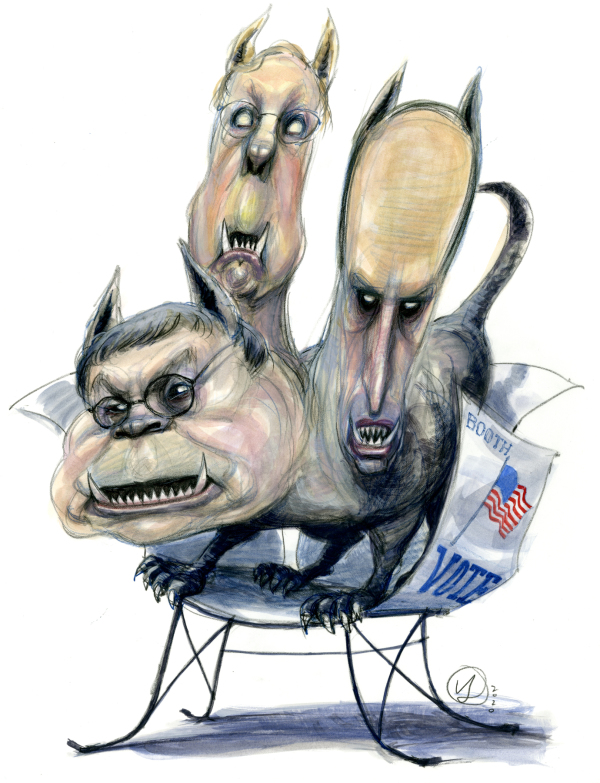
Illustration by VICTOR JUHASZ via Rolling Stone
ROLLING STONE: On November 3rd, 1981, Lynette Monroe, who lived in northwest Trenton, headed out to her polling place. It was Election Day in New Jersey. When Monroe, a Democrat, arrived at the polling site, she was stopped outside by a member of a group called the National Ballot Security Task Force. Monroe was asked if she had her voter-registration card with her. She said she did not but that it didn’t matter — she was a registered voter. But the National Ballot Security Task Force members “turned her away, preventing her from casting her ballot,” according to a lawsuit later filed by the Democratic Party, Monroe, and several others.
When she was turned away, Monroe had no way of knowing that the National Ballot Security Task Force was a massive voter-suppression project funded and carried out by the Republican National Committee and the New Jersey Republican Party. Republicans hired county deputy sheriffs and local policemen with revolvers, two-way radios, and “National Ballot Security Task Force” armbands to patrol predominantly black and Hispanic precincts in New Jersey. They posted large warning signs outside polling places saying that it was “a crime to falsify a ballot or to violate election laws.” The signs omitted any mention of the GOP’s role in this egregious intimidation scheme, but the intent was obvious: “to harass and intimidate duly qualified black and Hispanic voters for the purpose and with the effect of discouraging these voters from casting their ballots,” the lawsuit stated.
The result of the suit was a 1982 consent decree between the Democratic and Republican parties. Even though the RNC refused to admit wrong-doing in New Jersey, the group agreed to stop harassing and intimidating voters of color, including by deputizing off-duty law-enforcement officers and equipping those officers with guns or badges. Over the next three decades, Democrats marshaled enough evidence of ongoing Republican voter suppression to maintain the consent decree until 2018, when a federal judge lifted the order.
The 2020 presidential election will be the first in nearly 40 years when the RNC isn’t bound by the terms of the 1982 decree. Clark, the Trump campaign lawyer, told the group of Republicans at the private meeting last November that the end of the consent decree was “a huge, huge, huge, huge deal,” freeing the RNC to directly coordinate with campaigns and political committees on so-called Election Day operations. The RNC is sending millions of dollars to state Republican parties to vastly expand these measures, which include recruiting 50,000 poll observers to deploy in key precincts. Josh Helton, a lawyer who has advised the National Republican Senatorial Committee, has described Philadelphia, where black people make up 41 percent of the population, as “probably the epicenter for voter fraud in this country” and a likely target for the GOP’s 2020 poll-watching efforts. MORE
